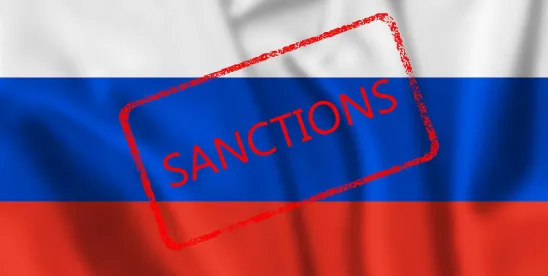On 18 July 2025, the Council of the European Union adopted additional measures which have been introduced in its 18th sanctions package in response to the ongoing conflict in Ukraine (the Package). This comprehensive Package targets:
- Cutting Russia’s energy revenues;
- Hitting Russia’s banking sector;
- Further weakening its military-industrial complex;
- Strengthening anti-circumvention measures; and
- Holding Russia accountable for its crimes against Ukrainian children and cultural heritage.
The sanctions Package also includes further measures against Belarus, which mostly resemble the measures taken against Russia.
Key Five Measures
Russia’s Energy Revenues
The European Union lowered the G7 oil price cap for Russian crude from US$60 to US$47.60 per barrel. This aims to reduce Russia’s oil revenue while keeping global supply stable. However, the effectiveness of this measure depends on enforcement—particularly by third countries and shipping insurers. So far, Russia has managed to sell much of its crude above the cap using its “shadow fleet”, so unless compliance and monitoring tighten significantly, this may remain symbolic rather than having an economic bite.
The European Union has also banned the import of refined petroleum products made from Russian crude—even if processed in third countries. Whilst this aims to close a key sanctions loophole, the challenge will be in implementation, as tracking oil origin through complex refining and blending processes has proven difficult.
The European Union has also imposed a full transaction ban on Nord Stream 1 and 2, including the provision of goods or services, with a view to prevent the completion, maintenance and future operation of these pipelines. This ban is not without its challenges as some EU member states have expressed concerns about the potential impact on their energy supplies, and there are ongoing debates about the effectiveness of these sanctions.
Russia’s Banking Sector
A full transaction ban was imposed on 22 more Russian banks, bringing the total number of Russian banks subject to such restrictions to 45. The Russian Direct Investment Fund (RDIF), its subsidiaries and its affiliates were also fully sanctioned. The aim of the European Union is to prevent Russia from using the RDIF to access global financial markets, circumvent EU sanctions, obtain foreign currency, sustain its war effort or increase the resilience of its economy. The European Union has also banned the provision of certain banking software to the Russian government and to Russian companies. These measures reflect the European Union’s push to deepen Russia’s financial isolation. Whilst these steps may impact Russia’s integration with Western financial systems, Russia has largely shifted trade settlement to yuan, reducing the likely impact of these measures and reducing the potential of it getting caught up in the US secondary sanctions regime.
Russia’s Military-Industrial Complex
This is arguably the most strategically important part of the Package. By cutting €2.5 billion worth of new export bans on dual-use goods and technologies—including advanced machinery, electronics and chemicals—the European Union aims to weaken Russia’s ability to sustain and scale its war machine. However, Russia has shown it can adapt. Shifting procurement to less-regulated states or shadows of subsidiaries and front corporations may undercut the impact of these new sanctions.
Anti-Circumvention Measures
105 more vessels were added to the European Union’s sanctions list, targeting tankers used to bypass oil sanctions, bringing the total of sanctioned vessels to 444. This is a clear escalation in the European Union’s effort to disrupt Russia’s illicit oil logistics. However, the shadow fleet is large, loosely regulated and constantly evolving, making this a complex network to oversee and target. This measure will pressure insurers, ports and maritime authorities to increase due diligence, but its impact depends on global cooperation, which may not be forthcoming from Russia’s current trading partners.
Further, the Package adds 14 individuals and 41 entities to the EU sanctions list, bringing the total number of individual listings to over 2,500. For the first time, the listings include the captain of a shadow fleet vessel and a private operator of an international flag registry. The listings also include entities providing direct or indirect support to Russia’s military-industrial complex or engaging in sanctions circumvention, which includes 15 entities established in Russia and 11 in other third countries (four in Turkey and seven in China and Hong Kong). This illustrates a potential shift in focus by the European Union, moving beyond Russian persons to those located elsewhere who are assisting in circumvention of the European Union’s sanctions regime.
Accountability for Russian Crimes
The Package also lists individuals involved in Russia’s “military education” of Ukrainian children. This brings the total number of designations in relation to the deportation and indoctrination of Ukrainian children to over 80. Following the earlier EU action in the 17th sanctions package (May 2025) which introduced the first listing of a museum official involved in the looting and promotion of Crimean cultural sites under Russian occupation, this Package lists a prominent Russian propagandist who is responsible for the manipulation of Ukrainian cultural heritage. The impact of this designation is largely symbolic as the European Union lacks extradition leverage or clear visibility into these regions. Therefore, unless paired with broader international legal action, this section of the Package appears to lack practical enforcement.
Measures to Protect Member States From Arbitration
The Package also comes with additional measures to protect EU member states and EU companies from investor-state arbitral proceedings on the basis of bilateral investment treaties concluded with Russia. This provision addresses scenarios where companies or individuals may challenge asset freezes or other restrictive measures through investment tribunals, claiming violation of investor rights, by blocking access to arbitration as a legal remedy. In doing this, the European Union is reinforcing the integrity of its sanction regime and shielding itself from legal and financial liabilities. This move is especially relevant given the number of Russian-affiliated companies operating in or through third countries with investment treaties linked to EU jurisdictions.
Conclusion
This Package reflects the European Union’s ongoing strategy to exert economic pressure on Russia whilst supporting Ukraine’s sovereignty. This Package acknowledges that sanctions evasion, third-party routing and enforcement gaps have diluted past efforts. The success of this hinges on international cooperation and coordination. The European Union continues to monitor and adjust its sanctions in response to developments in Ukraine and Russia.






 />i
/>i

